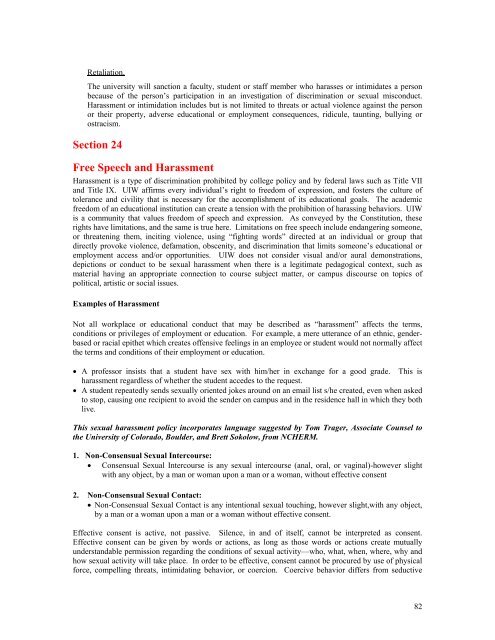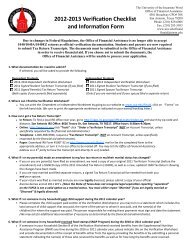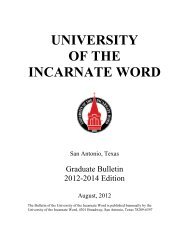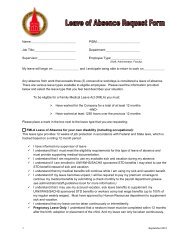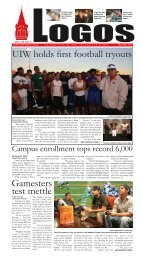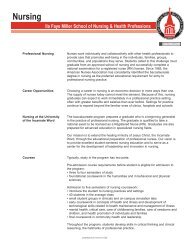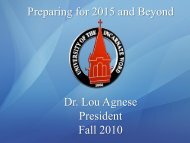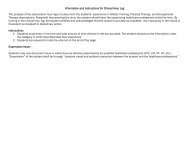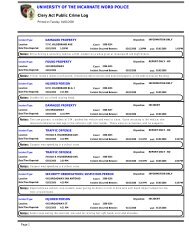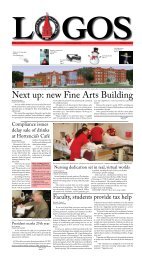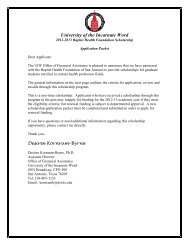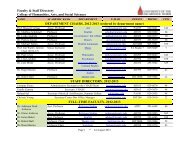2006-2007 Student Handbook - University of the Incarnate Word
2006-2007 Student Handbook - University of the Incarnate Word
2006-2007 Student Handbook - University of the Incarnate Word
Create successful ePaper yourself
Turn your PDF publications into a flip-book with our unique Google optimized e-Paper software.
Retaliation.The university will sanction a faculty, student or staff member who harasses or intimidates a personbecause <strong>of</strong> <strong>the</strong> person’s participation in an investigation <strong>of</strong> discrimination or sexual misconduct.Harassment or intimidation includes but is not limited to threats or actual violence against <strong>the</strong> personor <strong>the</strong>ir property, adverse educational or employment consequences, ridicule, taunting, bullying orostracism.Section 24Free Speech and HarassmentHarassment is a type <strong>of</strong> discrimination prohibited by college policy and by federal laws such as Title VIIand Title IX. UIW affirms every individual’s right to freedom <strong>of</strong> expression, and fosters <strong>the</strong> culture <strong>of</strong>tolerance and civility that is necessary for <strong>the</strong> accomplishment <strong>of</strong> its educational goals. The academicfreedom <strong>of</strong> an educational institution can create a tension with <strong>the</strong> prohibition <strong>of</strong> harassing behaviors. UIWis a community that values freedom <strong>of</strong> speech and expression. As conveyed by <strong>the</strong> Constitution, <strong>the</strong>serights have limitations, and <strong>the</strong> same is true here. Limitations on free speech include endangering someone,or threatening <strong>the</strong>m, inciting violence, using “fighting words” directed at an individual or group thatdirectly provoke violence, defamation, obscenity, and discrimination that limits someone’s educational oremployment access and/or opportunities. UIW does not consider visual and/or aural demonstrations,depictions or conduct to be sexual harassment when <strong>the</strong>re is a legitimate pedagogical context, such asmaterial having an appropriate connection to course subject matter, or campus discourse on topics <strong>of</strong>political, artistic or social issues.Examples <strong>of</strong> HarassmentNot all workplace or educational conduct that may be described as “harassment” affects <strong>the</strong> terms,conditions or privileges <strong>of</strong> employment or education. For example, a mere utterance <strong>of</strong> an ethnic, genderbasedor racial epi<strong>the</strong>t which creates <strong>of</strong>fensive feelings in an employee or student would not normally affect<strong>the</strong> terms and conditions <strong>of</strong> <strong>the</strong>ir employment or education.• A pr<strong>of</strong>essor insists that a student have sex with him/her in exchange for a good grade. This isharassment regardless <strong>of</strong> whe<strong>the</strong>r <strong>the</strong> student accedes to <strong>the</strong> request.• A student repeatedly sends sexually oriented jokes around on an email list s/he created, even when askedto stop, causing one recipient to avoid <strong>the</strong> sender on campus and in <strong>the</strong> residence hall in which <strong>the</strong>y bothlive.This sexual harassment policy incorporates language suggested by Tom Trager, Associate Counsel to<strong>the</strong> <strong>University</strong> <strong>of</strong> Colorado, Boulder, and Brett Sokolow, from NCHERM.1. Non-Consensual Sexual Intercourse:• Consensual Sexual Intercourse is any sexual intercourse (anal, oral, or vaginal)-however slightwith any object, by a man or woman upon a man or a woman, without effective consent2. Non-Consensual Sexual Contact:• Non-Consensual Sexual Contact is any intentional sexual touching, however slight,with any object,by a man or a woman upon a man or a woman without effective consent.Effective consent is active, not passive. Silence, in and <strong>of</strong> itself, cannot be interpreted as consent.Effective consent can be given by words or actions, as long as those words or actions create mutuallyunderstandable permission regarding <strong>the</strong> conditions <strong>of</strong> sexual activity—who, what, when, where, why andhow sexual activity will take place. In order to be effective, consent cannot be procured by use <strong>of</strong> physicalforce, compelling threats, intimidating behavior, or coercion. Coercive behavior differs from seductive82


